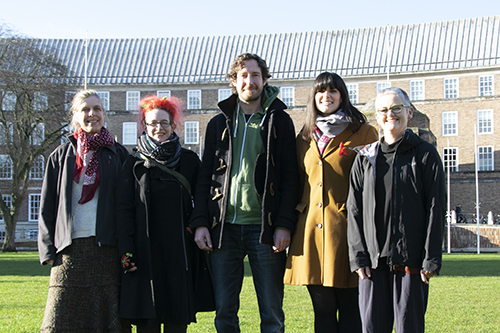The Bristol City Fellows Programme, funded by a £118,000 Impact Acceleration Account grant from the Economic and Social Research Council (ESRC), part of UK Research and Innovation, is led by the University of Bristol with Bristol City Council’s City Office and the Social Justice Project.
The new fellows, announced at the Mayor’s City Gathering on 10 January, will work with charities and community groups over 18 months to ensure marginalised voices have a say in decision-making and in turn tackle systemic inequalities across Bristol.
The programme is a key part of the University of Bristol's commitment to work collaboratively with the city to bring about positive change.
Over 40 people applied to be part of the fellowship, which was open to practitioners, activists and early career academics working with community organisations in the city.
The new Bristol City Fellows are Natasha Broad, Ben Carpenter, Lucie Martin-Jones and Anya Mulcahy-Bowman. They will join existing City Fellows Dr Helen Manchester and Professor Morag McDermont from the University of Bristol to tackle some of the challenges outlined in the Council’s One City Plan, launched a year ago, with a focus on the concerns of diverse communities.
Natasha Broad will work with Off The Record to empower LGBTQ+ young people to create change in their community through social action.
She said: "I aim to bring together some of the great work that is already happening in the city and provide a platform to empower LGBTQ+ communities.
"By ensuring that marginalised voices are included in city wide decisions, and are recognised as important facets of the community, we can create a stronger, safer and more inclusive city."
Ben Carpenter, who founded Grassroots Communities in 2017, will work with the most deprived communities in South Bristol.
He said: "I feel really proud to be given this opportunity to become a City Fellow supporting communities across Bristol to create lasting social change. Nurturing people and communities to support themselves yields the ripest fruit in the end."
Lucie Martin-Jones, Head of Community Services at WECIL (The West of England Centre for Inclusive Living), will look at improving healthcare and support for disabled people, ultimately creating new systems which are person-centred and allow disabled people more independence and control.
She said: "We will be looking at existing healthcare systems to establish how effectively they are delivering what matters to our citizens and how they can be improved. This works towards Bristol’s One City Plan aspirations for health and wellbeing.
"Within our role as a City Fellow, we will also seek to influence city governance, policy making, consultation and commissioning through using the evidence gained throughout this project."
Anya Mulcahy-Bowman will be looking at how the BOOST Finance Project at Barton Hill Settlement can be developed and used across the city. The project has tackled the taboo of the poorest people discussing their finances and offers support with budgeting, benefits, debt and employment.
She said: "The model offers a new way of collaborative working that wraps services around community need, putting the community at the heart of its design and response and connects with Bristol's One City Plan to address inequalities and create a more inclusive economy. Being a part of the Bristol City Fellows Programme is a great opportunity for this community."
Marvin Rees, Mayor of Bristol, said: "The One City Plan represents an ambition of creating an inclusive, sustainable city that both resolves our social fractures and inequalities and reaches carbon neutrality.
"It’s an ambition that is shared across communities and sectors and one that can only be achieved if every corner of Bristol has the opportunity to contribute and benefit from its success.
"The new Bristol City Fellows will play an integral role in ensuring an inclusive approach to meeting the challenges of the plan is followed and the voices of all communities form part of the solutions we are pursuing.
"I welcome the Fellows into their new positions and commit my support to help them achieve the best for the communities they will be working with."
